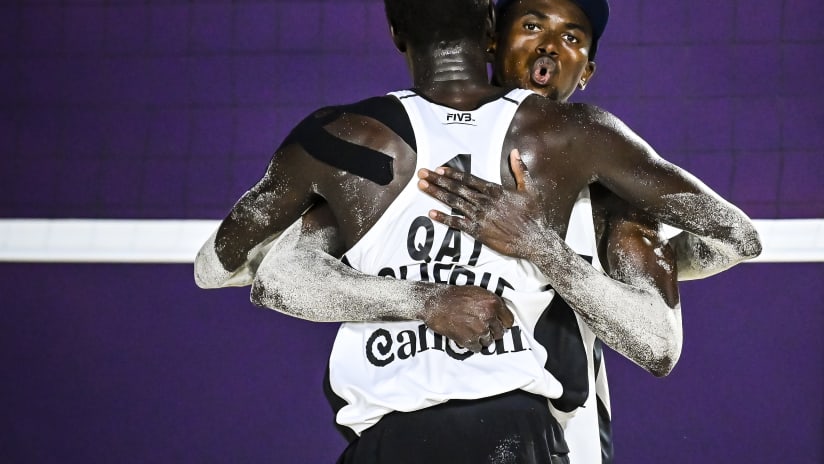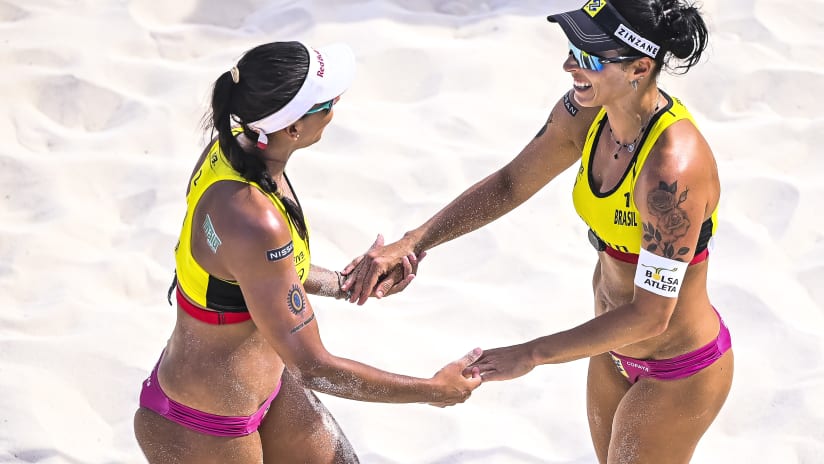The man on the mic doing play-by-play and colour commentary for the gold medal match of the final Cancun Bubble event was unloading an impressive inventory of every positive-thinking cliché he could muster. Maybe it was just to find something nice to say, or keep the viewers interested as Brazil’s Agatha Bednarczuk and Eduarda 'Duda' Lisboa closed in on a second straight gold medal, up 16-12 in the second set of the final match in Cancun over Australia’s Taliqua Clancy and Mariafe Artacho del Solar.
There's always time left for Artacho del Solar and Clancy
The Australians make huge comeback to win gold in Cancun
Published 03:09, 04 May 2021
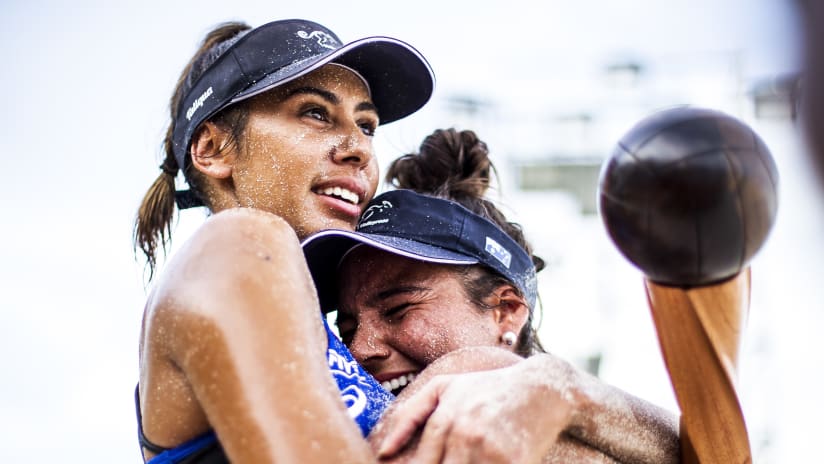
“There’s still time here,” he said. “There’s still points to play with for Australia to get back in it. It’s never over till it’s over.”
In that moment, however, it seemed just a matter of time. Agatha and Duda, who have medalled in every event in the 2021 season, were playing their usual, perfect brand of volleyball. Duda sided out the next, then made a dig and transition on the next, extending the lead to 18-12. Three points to go for a second consecutive gold medal, with a six-point cushion to help get them there.
Agatha and Duda do not give up six-point leads.
So the Australians simply took it.
Clancy then blocked Agatha in transition, then blocked another, this time on Duda, on the ensuing point. A lefty poke shot off a soft block made it three straight points for Clancy and Artacho del Solar. Clancy got her hands on the next but it wasn’t enough, as Agatha’s cut shot deflected safely onto the court. So maybe that was it, the run over. Australia’s valiant effort stuffed just shy of something quite epic.
But it wasn’t. Again, Clancy was there, hitting an option in transition to score, making it 19-16. Still a long ways to go, but close enough to maybe, just maybe give them a chance.
Another block cut it to 17-19.
Then another: 18-19.
An ace: 19-19.
Was this happening? A six-point deficit to one of the most consistent teams in the world had been erased in a matter of seven points. It was happening, all right, and would continue to do so, because there was Artacho del Solar, digging a line shot and converting in transition, giving, as crazy as this would have sounded just three minutes prior, the Australians the first set point.
Three points later it was Clancy again who put the final exclamation point on a set deserving of many of them, taking advantage of an overset, poking it to the deep half of the court where it would go untouched.
Indeed, this match was far from over until, as the announcer presciently proclaimed, it was over, heading towards the most improbable third set of the tournament. The Australians took advantage of the opportunity, closing out Agatha and Duda in three, 19-21, 22-20, 16-14, in a match befitting a three-tournament Bubble that needed an epic close.
“It always just comes down to our side of the net and our teamwork,” Clancy said. “We did a good job to just come back and take a moment and commit to our game style.”
Their game style was a refreshing one to see again. Only eight times prior to Cancun had we seen the Australians compete on the FIVB in this Olympic qualification period. This after Clancy had been named Best Server, and Artacho del Solar the Most Improved.
They were missed.
In three events in Cancun, they came away with three top 10 finishes and a gold medal.
“We kept strong,” Artacho del Solar said. “We stayed focused and here we are. So happy.”
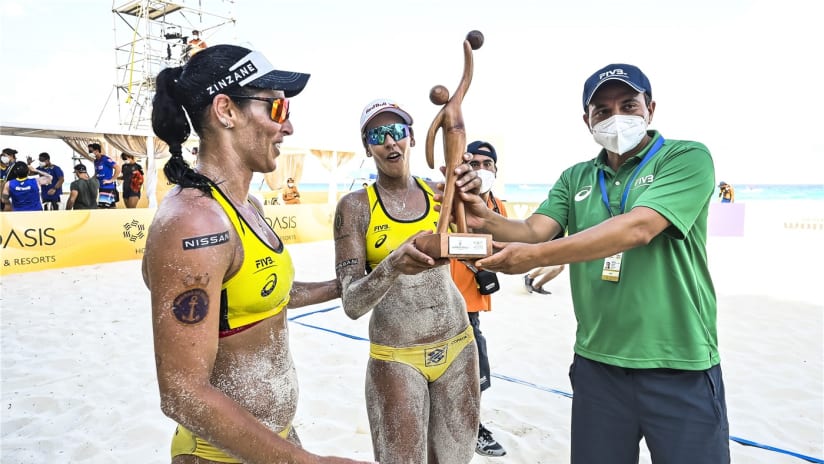
Agatha & Duda (BRA)
Three events, three gold medal winners
Prior to the Cancun Bubble, 12 tournaments in this Olympic qualification period featured both April Ross and Alix Klineman and Melissa Humana-Paredes and Sarah Pavan. In seven of those tournaments, at least one of those teams made the gold medal match, and three times did they play one another for gold, including the Doha 4-star in early March. Not since April of 2019, at the Xiamen four-star, has there been a stretch of three consecutive tournaments in which one of them was not won by either the Canadians or Americans.
Then came the hot and windy and humid and wonderful Cancun Bubble. It would be wrong to say that everything changed. The first tournament was nearly won by Humana-Paredes and Pavan, which would have made it two consecutive tournaments this year won by either the Canadians or Americans. But instead it went to Brazilian veterans Talita Antunes and Taina Lima, 19-21, 24-22, 15-10, who won their first gold medal as a team in nearly a decade. But the second and third events didn’t include either the Canadians or Americans in the final, which instead was a clash of Brazilians Agatha and Duda and young Russians Svetlana Kholomina and Nadezda Makroguzova, and Agatha and Duda and the wildly talented Australians.
Three tournaments, three different gold medallists.
It was quite the change of pace from a World Tour that has been so heavily dominated by the teams at the top of the hierarchy. Just two teams from either gender won medals in all three events – Agatha and Duda, Qataris Cherif Younousse and Ahmed Tijan – and of the nine medals handed out, six different teams made the podium.
The sport is far too talented across the board to have ever been boring, or predictable, but there was a certain sense of inevitability when it came to who was going to be competing in the finals. That sense of inevitability was erased in Cancun, where not only did three different teams win, but there was never a repeat gold medal match.
Qualifier teams were able to defeat both Ross and Klineman (Finland’s Niina Ahtiainen and Riikka Lehtonen), and Agatha and Duda (The United States’ Sarah Sponcil and Kelly Claes), while the No. 17 seed (Germany’s Karla Borger and Julia Sude) was able to fell Humana-Paredes and Pavan.
The hierarchy is shifting, adding depth, making virtually every match from ninth-place down must-watch television.
And there is especially must-watch television in the United States.
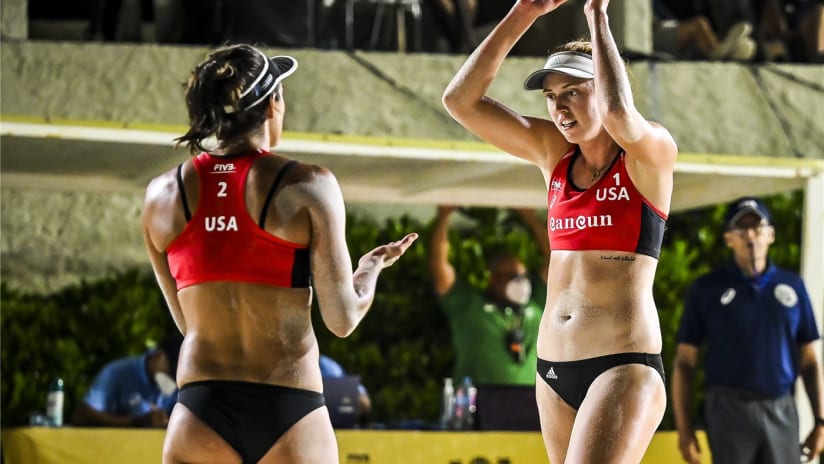
Kelly Claes & Sarah Sponcil (USA)
Kelly Claes, Sarah Sponcil making final push for Olympics
The team with the tallest order of any in the Cancun Bubble was, with little doubt, Kelly Claes and Sarah Sponcil. They entered Cancun as the seventh-ranked team in the world and third in the United States’ Olympic race. Yet their entry points were down, below that of Ross and Klineman, Kerri Walsh Jennings and Brooke Sweat, and Emily Stockman and Kelley Kolinske. This put Claes and Sponcil in the country quota and qualifier for all three events, as well as the preceding Doha 4-star. On top of that, to jump Walsh Jennings and Sweat in the Olympic race, they needed a medal.
In a feat that is nothing to sneeze at, they won all three country quota matches, beating Sara Hughes and Emily Day twice, Kelly Reeves and Terese Cannon once. They proceeded to qualify in two of the three events, and make quarterfinal pushes in those two main draws. A pair of close losses, to Sanne Keizer and Madelein Meppelink in the second event and Humana-Paredes and Pavan in the third, kept them from competing for the medal they needed, but Claes and Sponcil are loudly, forcefully knocking at the door of the Olympic berth they seek.
With the rest of the women’s Olympic spots via the rankings virtually locked up, the biggest race remaining is that of the final American spot, which is being contested for by Walsh Jennings and Sweat (6,960 points), Claes and Sponcil (6,800 points), and Stockman and Kolinske (6,360 points). While no medal was won by Claes and Sponcil in Cancun, something of almost equal value was: enough points to escape the country quota and qualifier.
Claes and Sponcil’s three fifth-place finishes this season – in Doha and Cancun twice – pushed them past Walsh Jennings and Sweat in entry points, putting the latter team in the country quota and qualifier in the final two events of the Olympic qualification period, in Sochi, Russia, and Ostrava, Czech Republic.
In a sense, Cancun was the ultimate set-up event: three straight tournaments to whittle down a three-year Olympic race to two final clashes, where all American eyes will be on three teams vying for a single spot.

